French President Praises Iranian Women For Their Fight Against Oppression
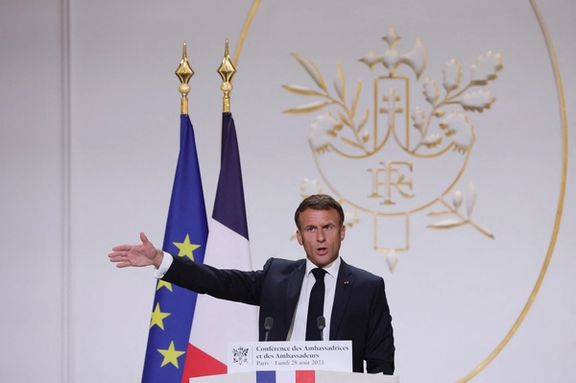
Emmanuel Macron, the President of France sent a message in support of Iranian women and their fight for freedom against the Islamic Republic of Iran.

Emmanuel Macron, the President of France sent a message in support of Iranian women and their fight for freedom against the Islamic Republic of Iran.
On Thursday, Macron posted on Twitter now X about this year’s Sakharov Prize being awarded to Mahsa Amini and the Women Life Freedom Movement in Iran.
“The Sakharov Prize is a powerful reminder of Europe's commitment to freedom.”
“It goes today to Mahsa Amini and to all Iranian women who are courageously fighting for their rights,” said Macron.
The Sakharov Prize is awarded each year by the European Parliament to honor individuals and organizations that defend human rights and basic freedoms. This year, the prestigious prize was given to Mahsa Amini and the Women Life Freedom Movement.
In 2022, the death of Mahsa Amini, the 22-year-old Kurdish-Iranian woman while in police custody for improper attire, sparked one of the most widespread anti-government protests across the country. The crackdown on protests resulted in hundreds of deaths and thousands of arrests by authorities, according to human rights organizations.
European Parliament President Roberta Metsola announced the 2023 laureate in the Strasbourg plenary chamber on Thursday with the award ceremony due to take place this December.
“We stand with those who, even from prison, continue to keep Women, Life and Freedom alive,” said Metsola referring to Narges Mohammadi, jailed activist who won the 2023 Nobel Peace Prize in early October.
“By choosing them as laureates for the Sakharov Prize for Freedom of Thought 2023, this House remembers their struggle and continues to honour all those who have paid the ultimate price for liberty,”
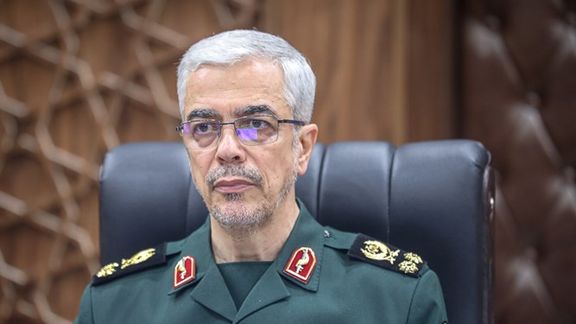
The Iranian Armed Forces have been calling on regional countries and allies to prevent the United States from sending weapons to Israel amid its war with Hamas.
Mohammad Bagheri, the chief of staff of Iran’s armed forces spoke to his counterparts in Qatar, Russia and Turkey this week urging them not to allow the US to use its bases in the Middle East for the transfer of arms to Israel, media in Tehran reported.
In his call with the Qatari defence minister, Bagheri asked for Doha to deny the US the use of its Al-Udeid airbase, a request which is under consideration, according to a post by The Crisis Watch.
Iran has been supporting Hamas with funds and weapons and it has repeatedly voiced its determination to destroy Israel.
Al Udeid Air Base is a military base located close to Qatar’s capital Doha and is home to headquarters of United States Central Command (USCC) and United State Air Force Central Command (USAFCC).
In 2019, the US and Qatar signed an agreement reaffirming Qatar’s commitment to supporting US military activities at the Al Udeid Air Base.
Qatar has a good relationship with the Islamic Republic and the United States and often acts as mediator between the two advisories.
Qatar facilitated the US-Iran prisoner swap in September which released $6 billion of blocked funds to the Iranian regime.
Bagheri also spoke to Turkish and Russian defense ministers warning about US arms supply to Israel and the possibility of other countries joining the war if attacks on the Gaza Strip continues.
“Sending weapons and arms will complicate things,” he said with regards to US support for Israel.
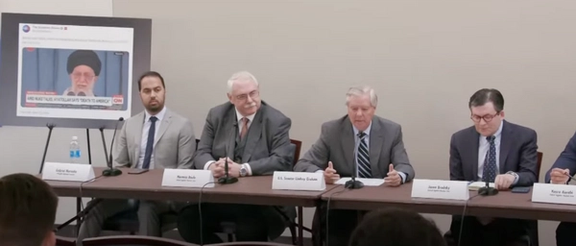
Amid Israel’s war against Iran-backed Hamas, US Senator Lindsey Graham hosted a panel of Iran experts to discuss how the US must take a firm posture to deter Iran.
Moderated by United Against Nuclear Iran (UANI) CEO Ambassador Mark D. Wallace, the Wednesday “Roundtable on Correcting US Policy Toward Iran” included several fellow analysts at the UANI and former US State Department advisor on Iran Gabriel Noronha.
The participants in the panel were all critics of the Biden administration's foreign policy and particularly its Iran policy.
Senator Graham (R-SC), who this week called for a joint military operation against Iran, blames the Iranian regime for Hamas' attack against Israel October 7 that can potentially lead to a multi-front full-fledged war in the Middle East.
Pointing to the Biden administration's official reaction to the attack claiming there is no evidence proving Tehran’s direct involvement, Graham quipped, “If you believe the Ayatollah in Iran woke up one day and read about this attack in the paper or saw it on TV, you're crazy!” He argued that Washington does not want to confirm Iran’s role because then it will be urged to act about it.
Referring to about 30 US citizens killed in the Hamas attack, which Iran has been celebrating since day one and glorifying as a victory for its so-called ‘axis of resistance,' Graham said the US should make Iran feel that there are consequences for the actions of its proxy militants across the region.
‘Axis of Resistance’ is a term coined by the Islamic Republic to refer to its proxy forces in the region including, Palestinian militant groups, the Syrian regime, the Lebanese militant group Hezbollah and other factions.
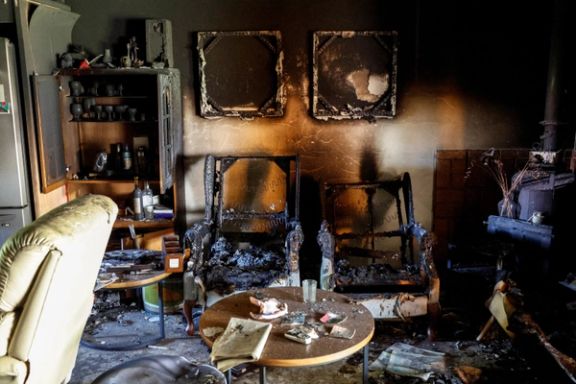
Referring to Jordan, Egypt and Palestinian Authority canceling their meeting with President Joe Biden this week, based on an exaggerated report about an explosion at a Gaza hospital, the Senator argued that US allies should also know there will be consequences for their behavior.
Referring to the possibility of Hezbollah and other Tehran-backed US-designated terror groups joining the conflict, he said that if this war expands, the US should start military action against Tehran. “If there was a war with Iran, we would win," he stated.
Graham urged the United States to stop the Islamic Republic, which seeks to destroy the Jewish state and has been very vocal about it; “Israel cannot afford two holocausts.”
He also said that the timing of the attack – often called on media as “the September 11 of the Middle East”-- is directly related to the news about the normalization of relations between Israel and Saudi Arabia, which Iran was warning against since other Arab countries did so in the Abraham accord. “This attack was so vicious and so cruel that it had a purpose: to make it so gruesome that Israel could not look away and has to go in on the ground, and the belief is that will stop the reconciliation process,” he said.
Emphasizing the threat posed by Iran in case it builds nuclear bombs, Garaham said North Korea, Russia or China have nukes, but they would not attack the US preemptively because they are not “religious zealots.” “The Iranians are motivated by religion. They want chaos to bring back the missing Imam. They want the end of times to unfold in in their lifetime so if they had a nuclear weapon, I am 100% confident they would use it as part of their religious crusade.”
The Biden administration chose to engage in indirect negotiations with Iran upon assuming office in early 2021 to revive the JCPOA nuclear accord abandoned by Donald Trump, but the talks failed and Iran in the meantime expanded its nuclear program. According to the UN nuclear watchdog the IAEA, Iran now has enough enriched uranium for up to 5 nuclear warheads.
Panelist Norman Roule, who served for 34 years in the Central Intelligence Agency (CIA) managing various Middle East programs, started with enumerating the incidents in which Iran’s logistic or intelligence support led to the killing of Americans in the region, such as the Beirut bombing in 1983, as well as Iran’s assassination and abductions attempts on the US soil.
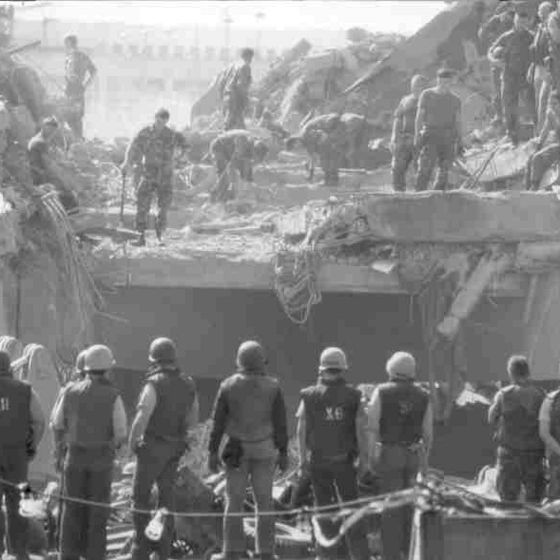
Roule criticized the US sanctions systems on Iranian officials as inconsequential since almost all of the sanctioned individuals would never seek to come to the US or own property there in the first place. He explained that not only such actions are symbolic but also encourage the adversary to say that “this is all they’re going to do.” “From Ukraine to Gaza; from Washington to New York; from Beirut to Yemen and Africa people are dying and will die unless this posture changes.”
Calling on the US as well as its European and Asian allies to confront Iran, Roule said that if the international community is not willing to confront Iran at present, “would they be willing to confront Iran with a nuclear weapon?” “Relentless diplomacy is a brilliant approach but endless diplomacy without deterrence is a gift to Tehran,” he stated.
He also slammed the lax enforcement of oil sanctions that have made Iran built up its foreign currency reserves “that would be very difficult and time consuming to gnaw down under actual serious sanctions.”
Jason Brodsky, the UANI policy director with deep insight into Iranian politics, pointed out that the Biden administration seeks to keep Iran's role in the Hamas attack “undefined” because saying that Iran was directly involved puts public pressure on the administration to do something about it. “It's apparent not only to Americans but to the Iranian regime that he is not keen on doing something about the Iranian problem.”
He noted that unless Iran believes that the US is willing to inflict grievous military losses on it, “the escalation is inevitable.”

“We can't just create deterrence by issuing a strongly worded press statement, warning of unspecified consequences... we can't restore deterrence with piecemeal sanctions on individuals who have no assets in the United States and are unlikely to travel here,” he said, stating that “there has to be a kinetic element to these policies to change the Iranian perception.”
Kasra Aarabi, a UK-based IRGC specialist, referred to remarks by British officials who labeled Iran’s Revolutionary Guards as the biggest threat on the UK soil, saying that there are mountains of evidence to prove that Revolutionary Guards are active on British soil. He explained how groups linked to Iran’s Supreme Leader are influencing the minds of British Muslim students with antisemitic and extremist ideologies, hosting events with IRGC commanders as speakers who “glorify IRGC terrorism.”
“They called on these students in London to join an apocalyptic Army to ‘end the lives of Jews’ around the world,” he underlined.
Urging the designation of IRGC as a terrorist group to limit their sway, Aarabi said that “despite the IRGC's persistent efforts not only to target British citizens directly but also to nurture homegrown Islamist radicalization and terrorism using methods like ISIS and Al-Qaeda through their centers... the IRGC is still not being proscribed.” “That’s the least Europeans can do.”
He emphasized that targeting IRGC bases in the region and inside Iran is not targeting the Iranian people, but “the very people who terrorize the people of Iran, the very people who killed Mahsa and Nika,” some of the most iconic martyrs of the boldest uprising against the clerical regime, came to be known as the Women, Life, Freedom movement.
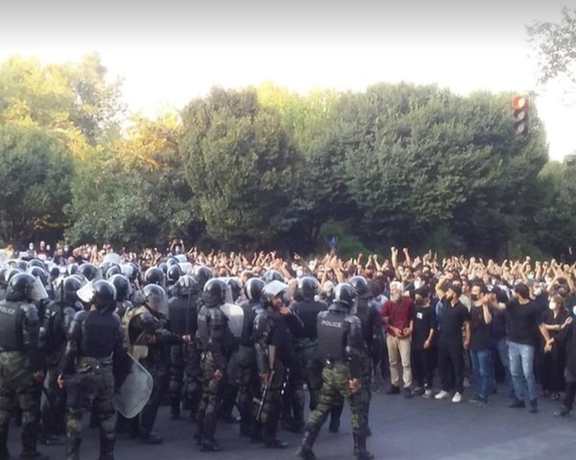
“Iranian people share a common enemy with the Israeli people; the Iranian people stand with the Israeli people because the force that is terrorizing the people of Israel is the same force that is terrorizing the people of Iran,” he argued.
Gabriel Noronha, a former special advisor for the Iran Action Group at the US Department of State, mentioned several incidents that happened exactly as were predicted. He said, Senator Graham warned that if we withdrew from Afghanistan, the Taliban would take over and they did; Senator Graham warned that if we didn't provide weapons to Ukraine and that if we didn't sanction [Russian gas pipeline network] Nord Stream 2, Russia would invade, and they did; Senator Graham is warning now that because we refused to enforce sanctions on Iran, we are headed towards a disaster.”
He said Iran was giving Hamas $100 million a year in 2017 and with the Trump administration's maximum pressure policy on Iran, the Islamist group had to adopt austerity measures, but today “Hamas is getting $350 million from Iran that is 93 percent of its budget.” The Hamas attack on Israel “has been a wakeup call.”
Referring to Iran’s assassination threats against former Secretary of State Mike Pompeo and former National Security Advisor John Bolton as well as the kidnapping attempt against human rights activist Masih Alinejad, Noronha said that “we cannot let the smoking gun be a dead senior American official or human rights dissident.”
Claiming that Iran earns over $150 million a day in oil income, he said the solution is to enforce sanctions to decrease the revenues “as close to zero as we possibly can that will dry up the money for terrorism.” He said when the oil sanctions were being enforced in 2019, Iran’s oil output had dwindled to about 300,000 to 400,000 barrels per day, forcing Iran’s militia groups to lay off fighters because they could not afford to pay them. Now, the regime’s oil exports are estimated to be nearly 2 million barrels.
“We have to tell Iran if you kill Americans, there are consequences. Right now, Iran does not believe there are consequences,” he said, adding, “There have been no missiles from the United States against Hamas; There have been no US missiles against the Iranian installations that fund and train Hamas fighters and there have been no attacks against Iran's oil infrastructure which funds all these attacks.”
“If we continue the status quo, things will get worse,” he noted, calling on Republicans and Democrats to work together and create firm accountability for Iran, which means Congress should authorize the President to take action and that requires Congress to pass laws.
He highlighted that the Iranian people want to overthrow the regime, saying that the US should “put pressure on the regime and the Iranian people will do the rest.”
UANI CEO Wallace said the US has no longer a doctrine of preemption but a doctrine according to which a large number of people should be sacrificed before Washington takes serious actions. “How many rockets must rain down on Israel before we act?” he asked.
“The doctrine of preemption is already over because they've already attacked. This attack by Hamas was already that Iranian attack,” Wallace noted.
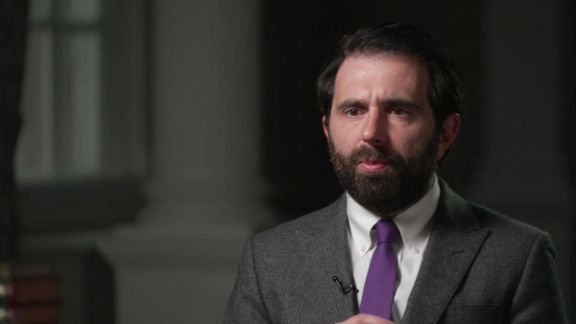
Britain’s counter-extremism commissioner has called on the United Kingdom government to proscribe Iran’s Revolutionary Guard Corps as terrorists like Hamas.
In a speech about extremist threats in the UK, Robin Simcox said on Thursday that the IRGC is carrying out acts of extremism not only around the world but also on British soil.
“We know one of Hamas’s key backers – financially and militarily – is Iran,” Simcox said in an address to the Royal United Services think-tank.
Simcox said that the UK, like the United States should protect its “national interests” and list the IRGC as a terrorist group. The US under the Trump administration designated the IRGC as a terrorist organization in 2019.
The warning comes amid growing concerns over state-backed threats from Iran to journalists and individuals living and working in the UK. Iranian-British journalists working for Persian speaking channels have been threatened of death and kidnapping by Iran agents, according to UK authorities.
In 2022, the Director General of MI-5 said that “Iran projects threat to the UK directly, through its aggressive intelligence services.”
Last year, Iran International reluctantly closed its London studios on advice of Metropolitan Police given serious threats to safety and security of its journalists. In September, after months of operating from its Washington DC bureau, Iran International relaunched its UK studios.
“The IRGC is not just a regular part of the Iranian government. It has operated like a terrorist organization ever since its inception, over four decades ago,” said Simcox.
“Who government does and does not proscribe is not down to me. But from a counter extremism perspective, I believe it is in the national interest,” he added.
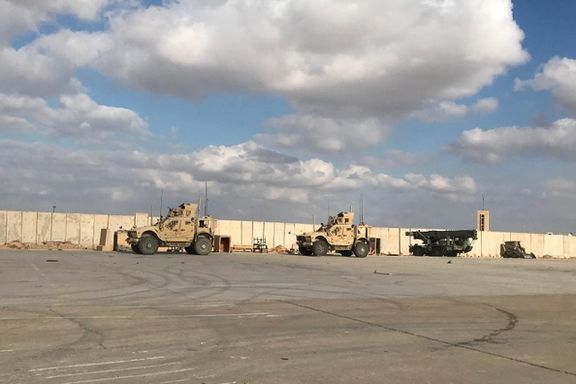
Drones and rockets targeted two military bases housing US forces in Iraq on Thursday, the latest in a series of attacks after Iraqi militants warned Washington against supporting Israel against Hamas in Gaza.
Rockets and drones were fired at Ain al-Asad air base, which hosts US and other international forces in western Iraq, and multiple blasts were heard inside the base, two security sources said.
The Iraqi military said it closed the area around the base and started a search operation. It was not clear yet whether the attacks caused casualties or damage, said the sources.
Rockets hit another military base hosting US forces near Baghdad's international airport, Iraqi police said on Thursday, without providing further details.
A US official, speaking on the condition of anonymity, said two rockets had been fired at US forces at the airport. One was intercepted and the other hit an empty storage facility and there were no casualties, the official added.
The latest attacks take to four in the past 24 hours targeting Iraqi military bases that hosts US forces in Iraq.
Last week, Iraqi armed groups aligned with Iran threatened to target US interests with missiles and drones if Washington intervened to support Israel against Hamas in Gaza following the deadly incursions by Hamas militants that killed 1,400 people.
US military forces in Iraq were targeted on Wednesday in two separate drone attacks, with one causing minor injuries to a small number of troops even though the US military managed to intercept the armed drone.
The United States has 2,500 troops in Iraq, and 900 more in neighboring Syria, on a mission to advise and assist local forces in combating Islamic State, which in 2014 seized swathes of territory in both countries.
Ain al-Asad air base is located in the western Anbar province.
Report by Reuters
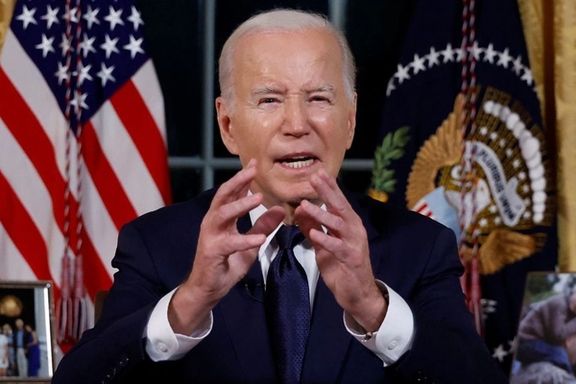
In a speech from the Oval Office, President Joe Biden asked for billions to be spent on the conflicts in Ukraine and Israel, but strikingly mentioned Iran only once.
Biden was speaking less than a day after his short visit to Israel. He tried to make the case to Americans that defeating Russia and Hamas is ‘vital’ for their national security.
“I know the conflicts can seem far away and it's natural to ask: Why does this matter to America?" Biden said. "History has taught us that when terrorists don't pay a price for their terror, when dictators don't pay a price for their aggression, they cause more chaos and death and more destruction.”
Around the same time as Biden’s address Thursday evening, rockets hit a military base near Baghdad's international airport, which hosts US troops and forces from other countries.
Curiously enough, the US President chose to say little about the regime in Iran, which supports almost every group in the region that acts against US interests.
“Iran is supporting Russia in Ukraine, and it's supporting Hamas and other terrorist groups in the region,” Biden said in his only reference to the Islamic Republic, “[we] will continue to hold them accountable.”
He didn’t offer any details as to what holding ‘accountable’ might actually mean or what substantive measures his government would take to rein in the Iranian regime.
Biden’s critics were quick to pick on him for what they see as ‘weakness’ or even ‘appeasement’.
"Biden could BEGIN holding the Iranian regime accountable by vigorously enforcing oil sanctions, and by reversing course on his appeasement policies that have enriched them with tens of billions of dollars," the Republican National Committee said in a statement.
The debate about Iran’s role in funding militant groups has become more prevalent in Washington with the Hamas attack against Israel on October 7, in which around 1,300 civilians were killed.
“Biden’s Oval Office address was a weak speech,” Senator Marsha Blackburn wrote on her X account (formerly Twitter). “Once again, Biden failed to hold Iran accountable, commit to freezing the $6 billion to Iran, or pledge to withhold aid to Hamas.”
Lawmakers have been pushing for a ‘refreeze’ of the $6 billion in Iranian oil revenues that the Biden administration released to secure the freedom of five Iranian-American hostages.
Critics of the administration have called this a ransom, warning that it could lead to more hostages.
“Joe Biden has a hostage crisis on his hands,” wrote General Mike Flynn, Donald Trump’s controversial former US national security adviser. “It’s the worst since Islamic revolutionaries stormed the U.S. Embassy in Iran in 1979 and captured 52 Americans. This time, it’s Iran’s Palestinian asset Hamas that’s holding more than a dozen Americans.”
Tensions run high in the region in the wake of an explosion in a Gaza hospital for which Israel and Hamas blame one another. At least 3,000 Palestinians have been killed so far in Israeli airstrikes, according to officials in Gaza.
Many fear that the war between Israel and Hamas may spiral out of control and bring in other regional actors such as Hezbollah or Shi’a armed groups in Iraq.
Last week, some Iraqi groups threatened to target US interests with missiles and drones if Washington intervened to support Israel against Hamas in Gaza. In the two days, a US Navy warship operating near Yemen and US military bases in Iraq and Syria have come under drone attack.
The United States has 2,500 troops in Iraq, and 900 more in Syria.